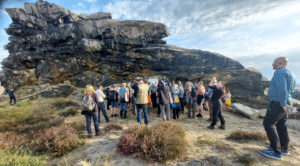Fellowships
The INQUA Fellowship Program financially supports early-career scientists (ECRs), as well as scientists from low- and middle-income countries/developing countries (DCRs), to gain international Quaternary research experience at a foreign institution for the duration of 3–6 months.
The aim of the INQUA Fellowship Program is to contribute to the development of collaborative research. The fellowship covers (part of) the costs associated with travel (economy class) and expenses (subsistence, accommodation etc.) of the fellow while living abroad up to a maximum of € 15000.
Current Call for Applications
Applications are invited from candidates in all continents/regions for the 2025 INQUA Fellowship Program.
Please read the guidelines carefully, fill in the application form, and submit it, together with the required documents (see guidelines), before 30 September 2025. If you have any questions, please contact INQUA at info@inqua.org.
Definitions
For the purposes of all funding schemes, the Executive uses the following definitions:
Early Career Researchers (ECRs)
For the purposes of funding, INQUA defines early-career researchers as graduate students and postgraduates within 8 years of receiving their final degree. This period of 8 years does not take into account periods of time taken not working as an academic or because of taking time off because of family responsibilities. Scientists who have been working for less than 8 years and who have permanent (tenured) positions, may still be considered as early-career researchers.
Developing-country scientists
For the purposes of funding, INQUA defines Developing-Country Researchers (DCR) – as those who are working in low income or lower middle income economies (see here for list of these economies). DCRs may, but do not necessarily have to, come from countries that are Members or affiliates of INQUA. In applying this guideline, INQUA will take into account that inclusion or exclusion from the OCSE list may not be an adequate reflection of the levels of science funding or funding to individual scientists. In particular, more senior scientists from low/lower middle income economies may still have sufficient levels of funding to enable them to participate in INQUA projects – applicants are asked to be sensitive to this issue when applying for funding, in order to ensure that funding goes to people who would most benefit from support. Please contact the President of the relevant Commission with any queries in relation to this.
INQUA Fellows
2026
Sutonuka Bhattacharya, Sharma Centre for Heritage Education, Chennai, India
Marishka Govender, Nelson Mandela University, South Africa
Abhishek Kashyap, Indian Institute of Technology Kharagpur, India
Lukas Gegg, University of Freiburg, Germany
Eugenia Marcotti, Institute of Dating and Archaeometry, Argentina
María Magdalena Velázquez Bucio, Universidad Nacional Autónoma de México (UNAM), Mexico
Jonathan Bellinzoni, (INCUAPA) (CONICET-UNICEN), Argentina
2025
Ambar Solanki, Wadia Institute of Himalayan Geology, India
Giuseppe Briatico The Institute of Archaeology, Israel
Khalil Azennoud, Mohammed VI Polytechnic University, Morocco
María Macarena Zarza, Museum of La Plata, Anthropology Division, Argentina
Monika Ruwaimana, Universitas Atma Jaya Yogyakarta Biology, Indonesia
Ramya Bala Prabhakaran, National Institute of Advanced Studies, India
2024
Alfred Houngnon, University of Abomey-Calavi, Benin
Daniela Piraquive-Bermúdez, University of Göttingen, Germany
Rieneke Weij, University of Cape Town, South Africa
Mitthu Dhali, Indian Institute of Technology Kanpur, India
Valentina Andrea Álvarez-Barra, Centro de Investigación en Ecosistemas de la Patagonia (CIEP), Chile
Muhammad Usman, University of Milano-Bicocca, Italy
2023
Driss Chahid
Gabriela Torre
Nannan Li
Nicolas Cosentino
Lauren Pretorius
Thamizharasan Sakthivel
Francesca Paraschos
Julieta Ines Massaferro
Shlomy Vainer
Sebastian Miguel Richiano
KurtHeinrich Wogau
Abdel-Aziz Abdrahamane Yassine
Eshaan Srivastava
Joaquin Arroyo-Cabrales
For details and project titles, please see this spreadsheet.
Uncategorized News
View moreLatest developments INQUA 2025 Sir Nicholas Shackleton Medal
INQUA 2025 Sir Nicholas Shackleton MedalThe INQUA 2025 Sir Nicholas Shackleton Medal recipient is Prof. Dr. Nicole Khan from the University of Hong Kong (Hong Kong)
 7th International Palaeontological Congress – IPC7
7th International Palaeontological Congress – IPC7The 7th International Palaeontological Congress (IPC7) will be held between 30 November – 3 December 2026 in Cape Town, South Africa
 Abstract Submission Open XXII INQUA 2027 Congress
Abstract Submission Open XXII INQUA 2027 CongressXXII INQUA 2027 28 January to 3 February 2027, Lucknow, India
- INQUA 2027 Talk Series
Join us for an engaging lecture by Dr. Qiuzhen Yin (Université catholique de Louvain, Belgium) discussing Astronomical Forcing: From Orbital & Suborbital Variability to Abrupt Climate Changes scheduled for Saturday, 06 Dec 2025 at 4:00…
 International Master in Quaternary and Prehistory (IMQP)
International Master in Quaternary and Prehistory (IMQP)The Università degli Studi di Ferrara, under the framework of the IMQP partnership agreement, invites applications for the International Master in Quaternary and Prehistory (IMQP) for the academic year 2024/25.
Celebrate the 2023 INQUA Fellows, distinguished for their remarkable contributions to Quaternary science. This honour recognizes their dedication to advancing research, fostering collaboration, and shaping our understanding of Earth’s past and future. Join us in applauding their achievements!
Delve deeper
Fellow’s Research
This page is a curated collection of research projects conducted by INQUA Fellows. It showcases innovative studies and pioneering contributions to Quaternary, fostering knowledge exchange and inspiring collaborative research across disciplines.





